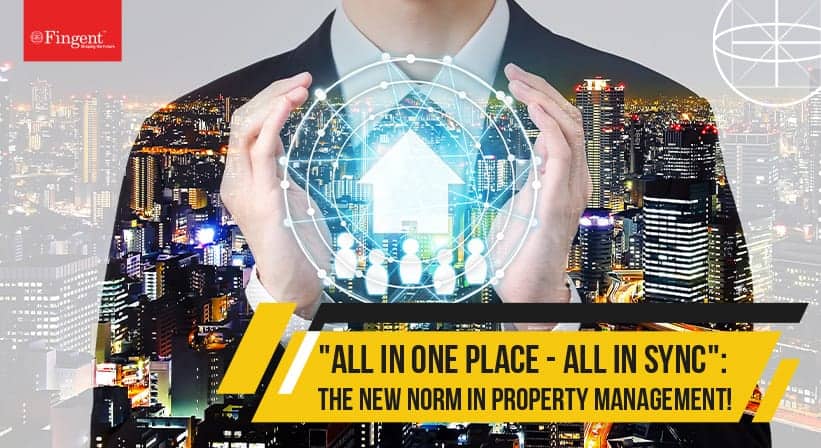Tag: custom property management software
Call it the innovation driver or the disruptive power, PropTech – the intersection of property and technology – has massively influenced real estate in recent years.
More than two-thirds of real estate players consider adopting new technology solutions as a strategic priority to survive and thrive in the post-pandemic era. While tech-driven innovation is crucial, the biggest challenge faced by real estate investors and property managers is to identify and implement the tech solutions that fit their purpose.
If you’re a property business trying to meet your expectations with the right PropTech, here’re a few solutions to focus on.
Read more: Reimagining Real Estate Operations with Fully Integrated End-to-end Solutions
Solving Real Estate Challenges with PropTech: Real-life Examples
Managing leads, arranging site tours, estimating prices, maintaining properties, handling documentation, and collecting payments are some of the major challenges hindering property management companies from scaling and growing their revenue. With the right PropTech adoption, you can mitigate them. Here’s the proof:
1. Property Listing
Keeping consistently accurate data across multiple property listing sites is a major challenge confronted by real estate aggregators. Equally important is to review the property’s performance across various listing sites.
The Challenge:
A US-based investment brokerage firm had a tough time getting real-time visibility into the performance of Commercial Real Estate (CRE) property listings. This affected their brokers’ productivity as they weren’t able to match properties to investors’ expectations. Even though the firm manages plenty of property data, legacy technology prevented them from making any gains out of it.
The Solution:
Thanks to predictive analytics and data visualization! Today, they’re realizing the benefits of data-backed decisions. With a cutting-edge net lease trading platform that leverages these tech innovations, the company is now able to personalize property and seller dashboards, track 1031 exchanges, compare listings, and help investors make better decisions.
Click here to read the full story.
2. Property Visits
Offering a safe and satisfying visitor experience to customers regardless of where they’re located is a crucial requirement in today’s competitive real estate market. There is an increasing demand for self-guided 3D virtual home tours and property visits, self-showing real estate apps, VR-powered property expos, and virtual staging tools among others. All these heavily influence buying decisions.
The Challenge:
Chasing a huge number of leads looking for leased properties and managing peak season demands were two of the major challenges that hit a leasing property management firm’s day-to-day operations. Showing vacant properties to clients across various locations via a self-guided application was an important step in connecting them to the right rental properties.
The Solution:
With an IoT-enabled self-showing application, the realtor could now virtually take visitors through vacant properties. As IoT helps consolidate discrete data from various software, the realtor could reduce unwanted overheads, minimize hardware investment, eliminate overlapping site visit schedules, and manage the growing number of leads effectively.
Want to learn more about the self-showing PropTech app? Click here.
3. Property Management Automation
Are your business development plans taking backstage due to a lack of automation? Do you rely on manual processes to manage buyers, sellers, and properties, contracting and leasing functions, property listing, and tracking, and finance and accounting? Solving this dilemma requires investing in an automated, customized PropTech solution.
The Challenge:
Inefficient communication systems, disconnected business segments, and poor customer experience failed to deliver a leading property management firm with the expected ROI. Lack of integration between various software handling individual business operations added to the prevalent inefficiencies. They needed a single platform that centralizes all the aspects of the property management life cycle.
The Solution:
Employing automation and the cloud, the realtor developed an all-in-one property management platform with customized interfaces for tenants, owners, and vendors. Cloud capabilities and automation enhanced their speed-to-market. The company grew from 2 to 160 employees within two years of implementing the software.
Read the full story to understand how the new platform serves as a robust single-source property management solution.
4. Price Estimation
With each property featuring unique attributes (such as location, floor plan, lot size, and other amenities), valuing real estate has become extremely difficult. Investors need to make more informed decisions and forecast potential earnings from a property over a given period of time. Establishing accurate property values requires churning myriads of data.
The Challenge:
Property businesses in the US lost many potential buyers as they failed to quote accurate property prices based on buyer data. Seamless coordination between buyers and sellers becomes possible only when property valuation is accurate and prices are competitive.
The Solution:
Automation and data analytics enhanced their property management skills and helped them estimate real estate prices precisely. With an integrated PropTech tool featuring a customized price estimation module, property agents get access to both investor data and pricing details, resulting in better productivity and more deal closures.
Read the case study here.
5. Real Estate Workforce Management
Managing property repairs or ensuring a property is fit for listing can be a strenuous job. Especially when handling multiple properties at the same time. Keeping track of the tasks at hand, or collaborating with the on-site workers, can take a toll if not effectively managed.
The Challenge:
Scheduling tasks, dispatching workforce to various properties, inspecting and auditing properties, keeping track of various tasks, and at the same time keeping all workforce effective, motivated and on the same page, might sound challenging, especially when the work culture keeps shifting from remote, to hybrid, to on-site!
The Solution:
The ReachOut Suite, primarily a field service management software, is a leading example of enabling an optimized field workforce. Want to assign property management tasks to your selected field service agents? Simply drag and drop the task onto their calendar. They will be alerted and you can track the progress of the task right at your fingertips, that too in real-time. ReachOut offers customizable inspection and audit templates to scrutinize your property and helps generate reports when you need them. Integrate ReachOut with your real estate inventory, accounting, quotations, and plenty of other business-critical functions to experience the power of automation and the cloud.
Click here to explore the features of ReachOut Suite.
Read more: What’s in Store for Real Estate This 2022
The Most Anticipated PropTech Trends
As PropTech continues to widely reimagine real estate operations, here’re a few trends that will hog the limelight in the coming days.
1. 5G
5G introduces extended connectivity for smart home devices with zero latency, improved augmented reality in home tours, flexibility to live and work from anywhere, and unlocks new revenue streams for CRE investors as they can lease rooftops to broaden 5G service delivery. 5G provides access to real-time data on building and infrastructure usage, tenant occupancy, and asset conditions. It facilitates instant monitoring of mechanical and electrical infrastructure in buildings, which will help avert problems before they occur.
2. Smart and Sustainable Homes
The average eco-friendly home cuts energy bills by 30%. When people are aware of their energy usage patterns and practices that harm the environment, they exercise more caution in energy usage and follow eco-friendly behavior. IoT and data analytics-enabled PropTech applications help homeowners understand better the benefits of sustainable living powered by smart home devices.
3. Neighborhood Analysis Using AI
AI and machine learning algorithms are now able to predict the evolution of urban landscapes over a said period. For instance, Google’s Street View images can be analyzed by AI to measure the safety score of a particular street based on the evaluation of data related to crimes, walkability, livability, amenities, and more.
4. Tenant Screening
PropTech applications that help owners identify financially qualified and reliable tenants will expedite the online leasing process and guarantee investors regular earnings.
Drones that facilitate virtual site tours, blockchain-enabled smart building contracts, and secure smart locks are also becoming hot pursuits in the PropTech market.
According to Metaprop, the global investor confidence in real estate technology has risen significantly, with 70% of investors planning to adopt PropTech in the next 12 months. Have you integrated PropTech into your real estate management business? If not, do take advantage of the technological revolution by partnering with a reliable PropTech development company. We develop customized property management software for our clients that leverage the latest technologies needed to make a firm stride in today’s dynamic real estate market.
Get in touch with us to understand how PropTech can take your business to the next level.
Stay up to date on what's new

Featured Blogs
Stay up to date on
what's new



Talk To Our Experts
Business Consulting & Technology Augmentation delivered by Fingent helps client evolve into a regional market leader, achieve quantifiable objectives and add multiple dimensions to their business repertoire
A Top Ranking Property Management Client
A leading property investment and management company, handling more than 8000 properties segmented under single family real estate wanted to implement technological transformations to their business to soar new heights. The client manages real estate portfolios of private equity funds, offering a vertical spectrum of services ranging from property acquisition all the way to lease or sale management.
Major Roadblocks in their Real-Estate Business
Back in the day, a typical brick and mortar operational model was effective for the client, if not sophisticated. However, overhead liabilities and persistent gaps of a manual process soon curtailed scalability, and automation was inevitable.
How a Wrong Decision Curtailed Their Business
A switch was made, and a leading off-the-shelf property management software was inducted into the environment. But as is the case with most implementations, migration was far from seamless. The software primarily catered to multi-family real estate requirements, and level of customization offered was too limited. The gap was however massive, even if customizations were to be made. In the simplest terms, when the rework was exceeding the value-added work that has been budgeted for, the client realized that the project is failing. This is what happened to our client when they attempted to introduce a ready-made property management solution for their processes.
When the software fails, it jeopardizes the company’s prospects. And if the failure is large enough, it can even steal the organization’s entire future. In fact, software failures can be traced to a combination of incorrect project management, technical, and business decisions.
For every problem, there is a solution that is simple, elegant, and wrong- H. L. Mencken
The client was forced to fall back on a plethora of excel sheets to manage million dollar transactions and persist with several manual processes. They were considering alternate vendors when detailed transparent analysis and ability to comprehend the business problem firmly tilted the decision in Fingent’s direction. Following multiple rounds of promising discussions, executives at the client side were excited to begin the core transformation project with Fingent.
Finding the Right Solution
With disparate cycles amalgamating into a vertically integrated solution, a phased approach had to be adopted. The challenge was to ensure business continuity while deploying solutions on a unified platform. Business processes were classified into three major cycles – Property Acquisition, Management, and Maintenance.
- Property Acquisition – Prospective properties get channelised through an application funnel for inspection and evaluation. The value range thus assigned to a property help bidders make decisions during auctions. Acquired properties get updated on the database, and transactional parameters and contracts are abided by in the system. An assigned property manager visits respective sites, to initiate renovation and development. Three distinct mobile applications were created – for Scouting, Bidding and for the Property Manager, which are tightly integrated into the property acquisition application.
- Property Management – Application enables lease ready properties to be listed. It syndicates with several listing sites and caters to the entire lead management cycle for sales associates. All contractual formalities for leasing are taken care of within the application. An accounting module caters to the rent collection process, with a section dedicated to handling exceptions including evictions. While a mobile application caters specifically to the functionalities of a leasing agent, another app helps tenants explore the properties themselves. The latter termed the self-showing app enables physical entry into a pre-booked property view session based on geographic coordinates.
- Property Maintenance – Comprehensive property maintenance application within the real estate spectrum, enabling tenants to raise support tickets for various issues. A mobile application allows tenants to connect directly with vendors that are pre-approved and listed.
By meticulously gathering and mapping requirements, an area of expertise for the Fingent team, the project met every major milestone on time and budget. Key highlights of the comprehensive property lifecycle management include:
- Cloud-based solution delivering features via the web and mobile platform, with the capability to scale at ease. An advanced property lifecycle solution that exhaustively covers all possible process flows in single family real estate
- Seamless integration with industry leading service providers for payment, credit verification, accounting, listings etc. Individual portals for the owner, tenant, and vendor.
- Efficient data sourcing enables tight department wise integration, helps to create proficient workflow and enables easy data migration from disparate data sources. To cite an example, all parameters can be imported while acquiring a portfolio, without manual intervention
- Facilitates transparency across functions and departments alongside exhaustive customized reporting, delivering maximized performance.
The Right Software Solution can Make a Good Business Great
Deployment of a unified platform, tightly integrating all functions within the property management life cycle, transpired into exponential business growth for our client. Streamlined, end to end automated workflow meant substantial cut back on their operational overhead, while enabling phenomenal scalability.
Fingent’s client got listed by the prestigious magazine Inc., ranking amongst the Top 10 Real Estate and Top 200 overall. A whopping growth of 2626% was registered over 3 years, and company valuation increased multifold. This lead to a 1.7-Billion-dollar hedge fund investing in the client to further propel growth.
The enterprise application suite is now maturing into a comprehensive product for the real estate industry, opening up a new line of business for the client in partnership with Fingent.
To Sum Up…
The average company spends about 4-5% of revenue on IT. Much of this money goes into software and hardware, software upgrades, software license fees, and the like, but a big chunk is still for new software solutions that are assumed to create a better future for the organization and its customers. Custom software solutions and enterprise applications are now one of the largest corporate expenses outside employee costs. Yet choosing the right software vendors and getting the right solution tailored made for your processes is mission critical for every business aiming heights in today’s competitive market.
Stay up to date on what's new

Featured Blogs
Stay up to date on
what's new



Talk To Our Experts
There were simpler times when hosting an open house was all that was required to sell a property. Real estate buyers and sellers are becoming much more sophisticated and real estate companies need technology to better cater to the changing needs of their customers. Real estate companies in the United States are integrating technology into their business process for better data insights, enriching customer experience and improving business efficiency.
Both Gen X and Gen Y use the internet and mobile as a first step to find or sell their dream home and 74% believe that the biggest benefit of having a real estate agent is helping them understand the process. Internet and mobile is no longer a fad, but an essential business tool to improve profits for real estate companies.
While there are many off-the-shelf applications such as Zillow, Trulia and others that allow for listing syndications, real estate companies are increasingly moving towards custom software solutions that not only provide listing syndications, but also provide additional functions as a CRM, ERP, a document manager and more. In this article, we aim to explore some of the areas where technology can improve business efficiency for a real estate company.
Valuations and Appraisal
Valuations are an important part of real estate and technology has helped by moving numbers into spreadsheets, but with a custom built valuation module the pain of collecting data for valuation is eliminated and the data is made available in a format that is easy to analyze and track.
Accounting and Finance
Financial information like expenses, income can help companies understand the cash flow situation for companies as well as manage client invoices and enable record keeping for financial compliances.
Client and Lead Management
Today, real estate companies have a variety of sources for lead generation, but how does one analyze the most profitable channels of customer acquisition or know when to call the client next? Having a technology solution embedded into the daily work process helps companies manage their leads better and manage existing clients with ease.
Transaction and Contract Management
As real estate grows, so does the mountain of paperwork! Paperless real estate transaction management software not only helps companies remove paper clutter, but also make information available 24/7 from anywhere in the world. This also allows real estate companies to collaborate from various locations and improve communication within the team.
Rental and Leasing
Managing multiple leases and rentals become easy when you have technology by your side. You can have reminders on renewal dates, quickly view financial information and store important documents in a centralized location.
Vendor Management
There are many benefits of having a vendor management solution for your real estate company. This includes improved turnaround time, better customer service, regulatory compliance and tracking.
Listing and Syndication
Most real estate companies already use some kind of a real estate syndication service, but these services are not integrated with the company database causing loss of productivity by duplication of efforts.
Portfolio and Asset Management
Portfolio and asset management allow real estate companies to manage multiple properties with ease and help analyze their internal rate or return.
Fingent has been fortunate to work with one of the biggest real estate companies in the United States providing them with real estate technology solutions which has transacted properties worth 600 Million. Click here to talk to us about how we can help your organization.
Stay up to date on what's new

Featured Blogs
Stay up to date on
what's new



Talk To Our Experts
What would it be like if you looked like one of the early men, wearing animal skins for clothes and using flint stones for a fire to cook food over, in the 21st century? Not quite a scenario that you can imagine yourself in, right?
Let me take you to a similar scenario. Several recent surveys* have proved that almost 53% of property managers relied on manual methods to manage all their property. This included paper records or spreadsheet software. Another 9% of property managers did not even have any method at all. Now, why is this not a good thing?
When you know you have a million things to do and you don’t follow any method to organize them in any way, there is every chance that you may mess up the whole thing. In the same way, property managers may have a million things to do and there has to be some method that they can use to organize their activities. They also need to be able to do it in the most efficient way possible. In other words, they need to manage all their property in an efficient way.
Property management involves a range of functions from the time a property is lease-ready. Eg. rental or lease management, listing management, tracking prospects etc. It is important to integrate all these functions into a single solution. Using different methods to manage each of these functions would only lead to further confusion.
The solution!
A single property management system that has specific features to integrate all the functions related to property management would be the most appropriate solution. One that is cloud based and that can be accessed through a browser or a smartphone.
If you look at the advantages of having such a property management system you will wonder why anyone would consider doing things otherwise.
- Ease of access – when all verticals of property management such as leasing and rental management, lead management, maintenance etc. are handled from a single solution through separate modules, it makes it easy for the managers to access information easily.
- Better integration and transparency – when all the processes related to marketing, sales, accounting etc. are handled in one platform there would be better integration and transparency between the departments.
- Aid to on-the-go managers – integrating with mobile platforms as well, it enables on-the-go managers to access information, make or accept payments etc.
- Cloud features – being cloud based, it has advantages like real-time availability of information & communication, lesser chances of loss of data, reduced time & effort in managing properties on the whole, all contributing to effectiveness and efficiency.
- Wider reach to your property – syndication with listing partners and other third party engines makes the processes of listing and accounting etc. much easier and gives your property a much wider reach.
- Provision of useful insights – easy generation of reports provides necessary insights for management.
- Reduction in expenditure – minimizing the use of manpower and/or deployment of separate management systems for each vertical, the overall expenditure is reduced.
Customization is the key
These advantages or features may be customized further to suit the different requirements of businesses. As a matter of fact, customization is the key to any management system becoming successful. Eg. the different modules may be customized to have extensive features depending on the workflow.
Thus, I would say, a good property management system will have the above mentioned general qualities plus the necessary customizations. A regular Property Management System is something that is available easily, but the best one would be, one that can be aligned with the business structure of an organization or property manager and not one that would necessitate the alignment of the business structure, with the system.
* Source – Apartment Management Software BuyerView 2014 from Software Advice
Stay up to date on what's new

Featured Blogs
Stay up to date on
what's new





























































